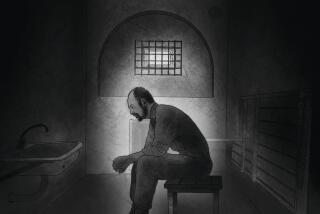Russia’s IOU to Farmers: Plowshares Into TVs : Economy: Five years ago, Moscow promised the luxury items. Now the cash-strapped government may not be able to pay up.
- Share via
MOSCOW — The coal miners have been threatening to strike again. Power plant workers once more are demanding overdue wages. And now, this week’s announcement: The government owes cars, refrigerators and television sets to hundreds of thousands of farmers who turned over their crops five years ago in exchange for promises of luxury goods.
From her paper-heaped desk at the Finance Ministry, Elena Martianova sees no way out.
As the official in charge of Russia’s huge internal debt, Martianova keeps track of IOUs--and the way she figures it, the farmers will have to wait a good while longer before getting their hands on imported fridges or remote-controlled TVs.
First Deputy Finance Minister Andrei Vavilov announced plans this week to redeem the farmers’ chits by 1997.
But Martianova, cheerful in her incredulity, must contradict her boss.
“It’s such a colossal sum,” she said, running her manicured nail down a typewritten list of debts. “To repay it in two years is just not possible. I think it’s totally unrealistic.”
Indeed, the farmers must stand in line with millions of other Russians who have not received their salaries on time. So far, Martianova said, the farmers, “strangely enough, have not complained.”
But all around them, other creditors are loudly demanding their due.
Rallies across Russia this week drew tens of thousands of citizens frustrated by the broken-down payment system.
The Coal Industry Workers’ Union plans a major demonstration Wednesday, although it called off a planned strike. And the regional administrator of Moscow snagged President Boris N. Yeltsin’s attention Friday to press for prompt payment of back wages for teachers and health-care workers.
Such protests have become routine in recent years, as employees in nearly all industries--from factories to fisheries to the circus--have had to deal with erratic payment schedules.
Miners in the Vorkuta coal pits of northern Siberia, for example, received their August wages just this week. In other industries, some managers have had to dole out wages in the form of commodities, such as boots or instant potato flakes.
Anger at the perennial cash shortages sparked a backlash against the ruling party, the pro-reform Russia’s Choice, in the 1993 elections.
The latest flurry of discontent comes less than three weeks before parliamentary elections. Hoping to mute voters’ sour moods, the government has promised to make good on its debts to the military and compensate victims of financial swindles.
And Friday, Economics Minister Yevgeny G. Yasin trumpeted a bit of cheery economic news: The annual inflation rate dropped slightly in November to 4.5%.
Russia’s once-wild inflation rate has steadied over the last few months, largely because of the government’s successful efforts to stabilize the ruble.
Since July, Russia has kept its currency trading between 4,300 and 4,900 rubles to the dollar.
After meeting with advisers in the sanitarium where he is recovering from his latest bout of heart trouble, Yeltsin announced that he will let the ruble slip slightly starting Jan. 1.
For the first six months of 1996, the ruble will be allowed to sag as low as 5,150 to the dollar, a rate designed to perk up lagging exports.
Looking hearty and speaking forcefully in a television appearance Thursday night, Yeltsin said he believes that the steady ruble rate is “a good step” toward keeping the economy on an even keel.
Yet in her stuffy office, Martianova sees little cause for optimism.
Lately, she has been preoccupied with Russia’s debt to the farmers. True, the government has settled accounts with nearly two-thirds of them. But that still leaves 151,000 waiting for cars and nearly as many in line for refrigerators--not to mention those waiting for washing machines and videocassette players.
Redeeming the farmers’ chits will cost more than $4 billion, Martianova estimated.
“In the future, of course, we’re going to pay,” she said, “but we don’t have the mechanism for it right now.”
While economic news and political spats preoccupied many government officials this week, there were fresh developments in the fighting that has flared anew in the breakaway republic of Chechnya.
At a press conference to mark the upcoming year’s anniversary of the conflict, human rights activist Sergei A. Kovalev estimated that as many as 40,000 people have been killed in the region, including a dozen journalists, the Interfax wire service reported. Other estimates have pegged the deaths at 20,000.
Meanwhile, Russia’s Itar-Tass news service reported that Chechnya’s education minister, a member of the Moscow-backed government, was kidnaped from a street in the capital, Grozny. No details of the incident were reported.
More to Read
Sign up for Essential California
The most important California stories and recommendations in your inbox every morning.
You may occasionally receive promotional content from the Los Angeles Times.













